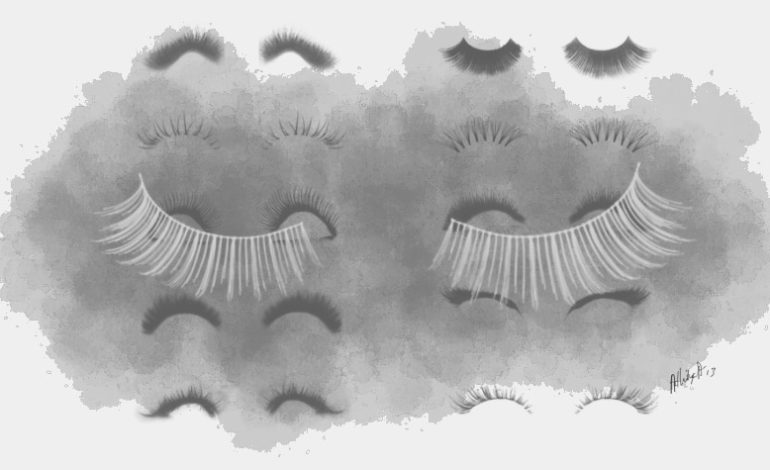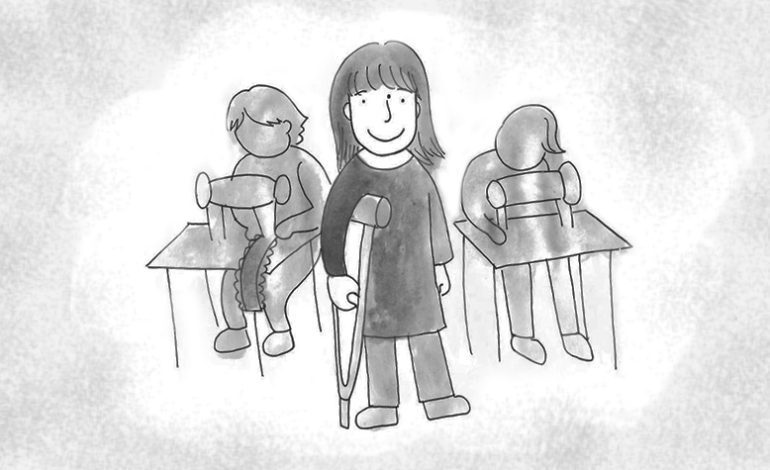False Lash Industry Changes Women’s Lives in Java Town

The upbeat tempo of house music was blaring inside the factory building, where dozens of mostly female employees sat shoulder to shoulder at a long wooden desk, eyes fixating on the task at hand, cutting, ironing, sewing or gluing strands of hair to make false eyelashes.
“It’s a delicate job, one can easily get tired or sleepy, that’s why we always play upbeat music,” said Joshua, an accounting and marketing staff at PT Braling Wisnu Satriya, as he accompanied Magdalene to tour the factory in Purbalingga, Central Java.
It was 3 in the afternoon in the middle of November. Rain was pouring outside, sending humidity in the sparsely air-conditioned factory to a stifling high.
Established in 2009 by two local businessmen, Braling employs 200 people who work nine hours a day, including three breaks in between, producing 100,000-200,000 pairs of false lashes every month. They are sold in big bulks at Rp 2,500 (US$0.2) to Rp 10,000 a pair.
About 80 percent of the products are shipped to England, Australia and Nigeria, where they are given local brands and sold in stores or beauty salons. The remaining 20 percent are sold in domestic market.
These are falsies of good quality, worn by the likes of world-class celebrities like Katy Perry, Adele, Angelina Jolie and Jennifer Lopez.
“Some of our customers told us that our eyelashes are worn by those celebrities,” said Company Vice Director Denis Aditya Salim over the phone.
Braling is just one of several false eyelashes producers in the area, where the industry of hair and synthetic hair products has increasingly generated income to much of the population, especially women.
It is not clear why and how Purbalingga became the hub of lash producers in the country, but locals recall that since the 1970s, plenty of people have sold wigs made of human hair from door to door. As the business grew, the wigs were exported to markets like Hong Kong.
Eventually, the industry expanded to other hair-related products like hairspray and eyelash extensions. The door-to-door salespeople now supply human hair for factories, which pay Rp 50,000 per kilogram of hair.
Braling uses both human and synthetic hairs for its products, but human hair, though 20 percent more expensive, are still preferable.
“About 60 percent of our products are made from human hair,” said Joshua.
“It’s high maintenance because it requires more sterilization process, but the end product is lighter and it gives more natural look,” he said.
Business is looking up for the company. In November, it participated for the first time in Cosmoprof-Asia in Hong Kong, the leading business-to-business beauty trade exhibition in Asia, hoping to expand its market.

Economy vs. Divorce Rate
The growing business of wigs and falsies has lured investors to Purbalingga. Data from Purbalingga Office for Capital Investment and Integrated Service (KPMPT) shows that as of 2012, 80 investors have set up business in Purbalingga, totaling Rp 342.5 billion (US$28.4 million) in investment. Two of the investors are from South Korea, with Rp 35.8 billion investment, while the rest are national companies.
The labor-intensive industry has created jobs for local women in Purbalingga as well as neighboring towns like Banjarnegara. After graduating from junior or senior high schools, these women normally apprentice at the town’s vast cottage industries, which provide additional supplies of eyelashes to the factories, before moving up to apply at the companies.
“We only look for experienced workers. We test their skills,” said Joshua.
So high is demand for skilled workers that hijacking employees is a common practice among the companies.
Said Iin, 26:“I worked here (at Braling) for three years, before moving to another company for a year.”
The mother of a seven-month old baby said she came back to Braling, however, because conditions at the other factory were tougher.
 Before the hair business thrived, unskilled women in the area used to earn a living as domestic help either locally or at bigger cities. Many locals complain now that it is now difficult to find women who are willing to work as maids, as they prefer to work at the factories.
Before the hair business thrived, unskilled women in the area used to earn a living as domestic help either locally or at bigger cities. Many locals complain now that it is now difficult to find women who are willing to work as maids, as they prefer to work at the factories.
“I have to find a maid from other cities in Central Java because everybody prefers to work at the factories,” said housewife Titi Sumanti, a native Purbalingga who lives in Jakarta.
Certainly, the factories pay better than the monthly payment of Rp 500,000 received from working as housemaid. The minimum wage in Purbalingga is currently at Rp 896,000 per month and will be raised to Rp 1.023 million in 2014.
An aspiring politician from Banjarnegara, Hartanto, said while the industry boosts the economy of Purbalingga and the neighboring areas, he was concerned with its social impacts in the area, including the lack of interest for young people to pursue higher education.
“Many people think junior high school education is enough because they can work at the factories anyway,” he said.
And then there is the high divorce rates in Purbalingga, which some blame on the rise of financially independent women dumping their husbands.
Local Religious Court noted that there were 1,784 cases of women filing for divorce in 2012, over three times the cases of men filing for divorce at 567. The figure has likely risen in 2013, with 1,369 women filing for divorce as of August this year.
Hartanto offered his explanation: “Most couples marry young and many of the husbands don’t work. These men can’t find jobs, or they have to work menial jobs as construction workers in other cities.”
But surely, a financially independent woman is better single than staying with deadbeat husbands?
“Yes, but what about the children?” asked Hartanto, who is a member of the National Democratic Party (NasDem).
He added that working at the lash factories requires skills that are very specific and cannot be applied in other industries, making it unsustainable.
“Each worker has a specific task, like cutting or ironing the hair. Nobody can make eyelashes from the start until the end product. Also, the delicate job contains high health risk,” he said.
But back in Braling, factory workers Iin and her friend Ami, 20, were happy with their job. At least they could save up some money, they said.
“It’s not like there are many other job options out there,”Ami said.
They excused themselves and walked out, joining the throng of fellow workers who braved the drizzle on their motorcycles to go home to their families.






















